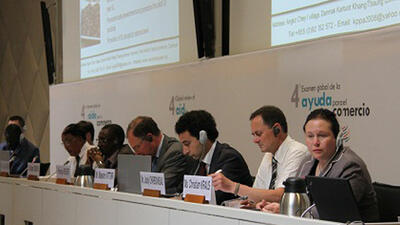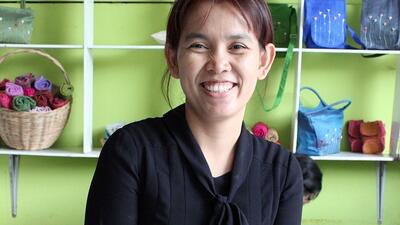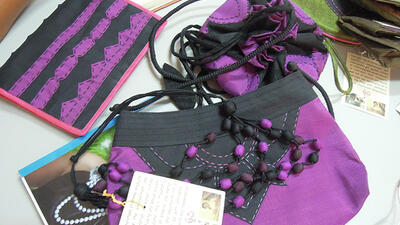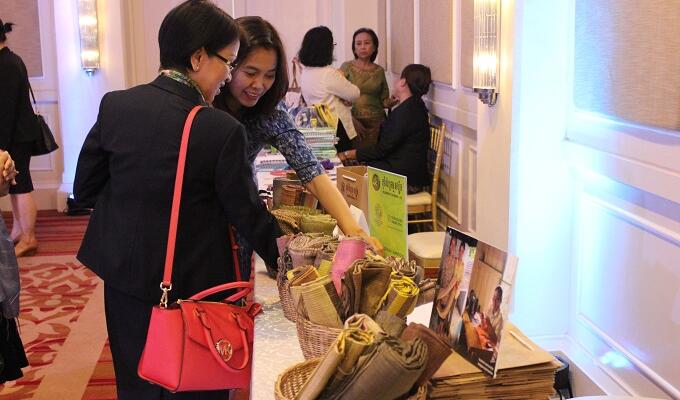
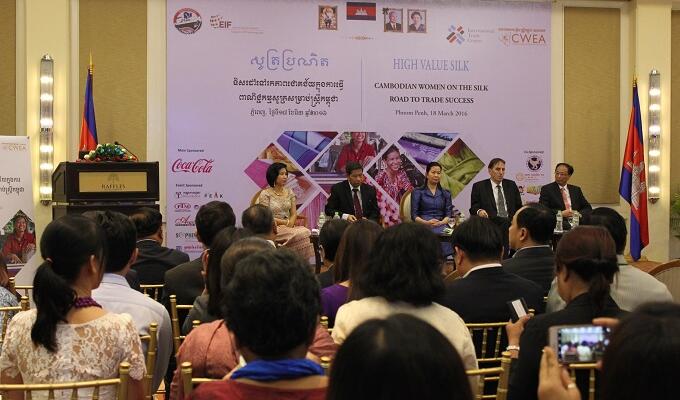

Increasing incomes of Cambodian women entrepreneurs in silk sector
Silk-weaving women in Cambodia are working their way out of poverty, and the silk sector plays a key role in reducing poverty and empowering women. That was the central message of the ‘Cambodian Women on the Silk Road to Trade Success’ event in Phnom Penh on 18 March.
More than 100 representatives of government, business and development partners participated in the event, organized by the International Trade Centre (ITC), the Ministry of Commerce of Cambodia and the Cambodia Women Entrepreneurs Association (CWEA).
The event – organized under the High Value Silk Project of the Cambodia Export Diversification and Expansion Programme (CEDEP) I – featured a product exhibition and a fashion show showcasing handmade, high-end silk clothing and accessories designed by Cambodian companies with ITC support. The project is funded by the Enhanced Integrated Framework (EIF) Trust Fund and implemented by ITC and the Ministry of Commerce.
Opening the event, Mr. George Edgar, Ambassador of the European Union (EU) to Cambodia, said: ‘ITC support has helped to create new jobs, mostly for rural women, and increase profits that have been invested in their families' welfare, children's education and the development of small businesses.
‘The EU has supported the Government of Cambodia to help Cambodia better integrate into the world trading system and use trade more effectively to eradicate poverty,’ he added. ‘The EU intends to further assist Cambodia's trade and private-sector development in the coming years.’
Mr. Xuejun Jiang, Chief of the Office for Asia and the Pacific, ITC, said: ‘ITC emphasizes the economic empowerment of women in all our work, in support of the Global Goals for Sustainable Development. ITC’s support of the silk sector in Cambodia has largely focused on women entrepreneurs, and we have seen our targeted interventions reap rewards.’
Increasing sales, creating jobs
Villageworks, a handicrafts company, increased export sales by 35% and employment by 20% after receiving ITC support. The company has been certified by the World Trade Fair Organization and has received the ‘Good Design Award Mekong Design Selection’ in 2014-2016.
Social enterprise Lotus Silk and Boutique’s revenue from silk products has grown exponentially over the last several years, and the company has gained international buyers and hired more employees.
‘We are planning to contract more weavers if sales continue to grow and increase sericulture farming to twice its current size,’ said Ms. Vannary San, Chief Executive Officer (CEO), Lotus Silk and Boutique.
SentoSaSilk, one of Cambodia’s producers of custom-made dresses and retailers of silk fabrics, won international awards and increased sales by 30%-40% in 2015 after receiving ITC coaching and support.
‘We developed a brand identity, new product designs and marketing materials, and we established new sales contacts. We were able to design new collections matching market demand,’ said Ms. Seng Takakneary, CEO, SentoSaSilk. ‘Thanks to the ITC project, we are now developing a new project in Kandal, the Sot Reaj Centre, to develop Cambodia’s textiles and support 1,000 families.’
Craft Village has been diversifying its products while maintaining the weaving tradition and creating jobs for women weavers. With ITC support, the company increased export sales by 16% and overall sales by 57%. The number of buyers increased from 5 to 25, and the number of weavers contracted by the company increased from 2 to 15, whose income has also grown, according to CEO Naiseng Lang.
Ros Sarith is a 29-year-old secondary school teacher in the Lvea Em District who works as a silk weaver for Craft Village to complement her income.
‘Although I had been weaving for years, my technical skills were not up to date, and it was difficult to find clients,’ she said. ‘With training and coaching from ITC, my weaving techniques improved significantly and I was contracted by Craft Village, which I met during a study tour organized by ITC. Since then, my income from weaving has almost doubled. With the extra money, my family and I were able to save to build a traditional wooden house. As my income increases, I hope to subcontract work to other women weavers and help to improve their livelihoods.’
Measuring concrete results
These results – increased export sales, employment opportunities and incomes for women – are in line with priorities of the country’s trade strategy, the Cambodian Trade Sector-wide Approach.
The Cambodia National Silk Strategy provides a five-year plan to achieve, by 2020, ‘a modernized silk sector producing high-value products providing sustainable income for women and men’. The strategy, designed with ITC advisory support, was launched by the Ministry of Commerce and the Silk Sector Development and Promotion Commission.





